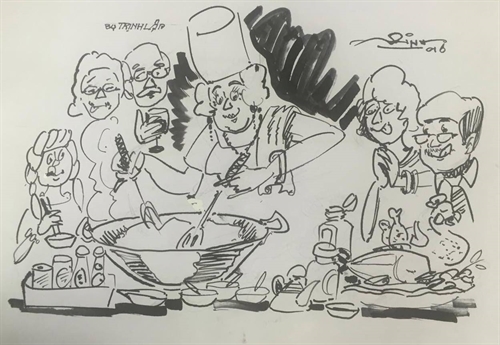 Talk Around Town
Talk Around Town

 |
By Mộc Miên
Over the last year, my mother has rarely bought food from traditional markets or processed food stores, but instead has ordered food from her colleague. My mother has not only ordered special food for holidays such as fruit jam, moon cakes and pork pies, but also daily meals such as caramelised braised fish and chilli sauce.
Nguyễn Hương Lan, 35, my mother’s colleague, is a resourceful woman. While working as a specialist in a private company, she also has a passion for cooking. In the beginning, Lan just cooked for her family. Then she started bringing food into the office for lunch. Women in the office often shared food and chatted about family life during lunch time. Lan gradually let everyone know about her talent for cooking.
“I shared my home-made food with my colleagues. They loved it and encouraged me to cook more to sell to them. I asked myself ‘Why not?’ It can help bring in more income,” Lan said.
Cases like Lan’s are becoming increasingly common these days as many people worry about unsafe food and food hygiene. On the social network Facebook and many other online forums, I can find quite a few people who provide home-made food. Most of them are women with stable jobs rather than professional cooks. Furthermore, most were not born into traditional cooking families. They are full-time-job workers who can spare time to cook and provide food to their friends and acquaintances.
“I am now so afraid of processed food sold in markets like roast pork, pork pies, braised fish, boiled chicken, sticky rice, etc. I often bought these items in the past, but because of information about poisoned additives in them, I have stopped. When I spend time cooking for my family, our health improves. I want to help the many housewives out there who have little time to cook have more food options,” said Trần Thu Trang, an online business housewife.
Because these are spontaneous businesses, the women usually have no business strategies. The key points are that they are curious about new recipes and healthy food, or care about the seasons in which the food is grown. They test the dishes first, then sell them to customers. Despite the word-of-mouth marketing, the housewives seem to become famous for good quality, affordable prices, and convenient delivery services.
“I make fruit jam, dried fruit, chưng cake and pork pie during Lunar New Year holiday. In summer, I sell fruit syrup, smoothies or sweetened porridge. In autumn, I make moon cake. In winter, I braise fish, beef and pork. There are many dishes to make depending upon the season,” said Liên, my mother’s colleague.
Customers are often friends, colleagues and other acquaintances. Over time, word spreads so the business housewives get more customers. Such a business model allows customers to trust that the sellers uses clean food, less additives, no colouring, and that the food is made under hygienic conditions.
“I hate unknown seasonings and colourings that are often used in street food and some traditional markets. Buying food from acquaintances assures me,” Trần Thu Hà, a customer, said.
“In fact, my family has little desire for complicated dishes. We just need rice and some ordinary dishes. We add more fruit to make the meal more attractive. Now we care more about the quality and cleanliness of the food to avoid health problems,” she added.
The trust of customers and the revenue of the housewives have nothing to do with the sadness of those who have sold processed food in traditional markets such as Hôm Market, Mơ Market and other processed food stores for years.
“In recent years, my retail situation has got worse because of such business models. My income has dropped,” said Nguyễn Thị Mai, owner of a dried food store in Hôm Market.
“It seems that gaining the trust of customers is so hard. They are scared of dirty and poisoned food,” Mai said.
At least they can eat without worrying about unknown processed food. It helps make the dishes more delicious. VNS









